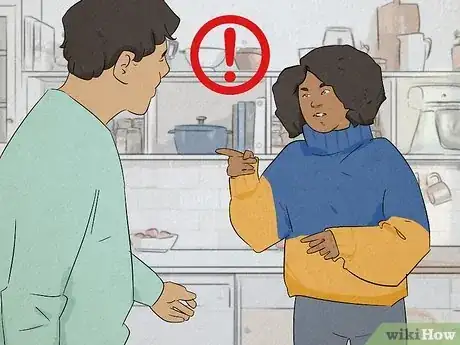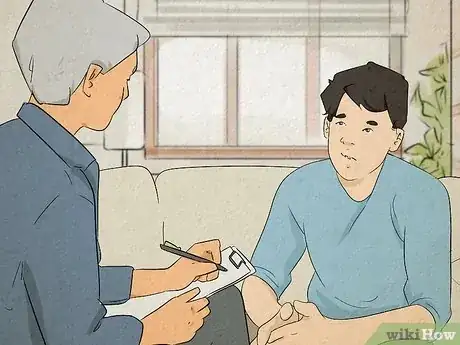This article was co-authored by Sabrina Grover, LMSW and by wikiHow staff writer, Kira Jan. Sabrina Grover, LMSW is a Licensed Master Social Worker (LMSW) who earned her degree in Advanced Clinical Practice from New York University. Sabrina has experience working in substance abuse recovery centers and schools where she gained experience providing evidence-based treatment to children, adolescents, adults, and families. Sabrina specializes in Dialectical, Narrative, and Cognitive Behavioral Therapies. She has particular expertise in treating clients struggling with grief, complex trauma, interpersonal difficulty, family conflict, anxiety, and depression. She commits to providing a supportive environment for everyone who commits to growth and offering a warm, non-judgmental atmosphere.
There are 8 references cited in this article, which can be found at the bottom of the page.
This article has been viewed 2,959 times.
You love your kids, and you want what’s best for them. But what happens when your child grows into an adult, and you feel like you’re giving them too much? How can you stop enabling your adult children and help them reach their full potential? We’ll walk you through how to spot enabling behavior and what to do about it. Read on to learn how to set boundaries with your grown child to foster a healthier relationship and help develop a happy, independent adult.
Steps
How to Stop Enabling Your Adult Child
-
1Address your own feelings and anxieties about letting your child be independent. You might feel the urge to help your child because you get uncomfortable or anxious seeing them struggle. Psychologists call this a “protection trap,” where anxiety and enabling behavior go hand-in-hand in a vicious cycle.[1] Or, you might be worried about stopping accommodating behavior because you’re concerned your child will react negatively. You might even feel like you owe your child something. The next time you feel like stepping in to help, run through this checklist to get in touch with your thoughts:
- “If I don’t help, what lessons will my child be able to learn from this?”
- “What outcome am I worried about if I don’t help?”
- “How likely is it that the worst outcome will actually happen? Is there a more positive, realistic way of looking at the situation?”
-
2Set boundaries with your child. The best way to stop enabling your grown child is to set expectations about their roles and responsibilities, especially if they’re living at home.[2] Ask yourself, “How much time, emotional energy, and financial support am I willing to give?” Then, clearly define what you expect from your child. Here are examples of ways to set boundaries:
- Request that your child help out with chores: “We expect you to contribute to this household by helping with grocery shopping and taking out the trash every night.”
- Create clear limits for financial support: “I’ll give you $40 towards your student loan payments this month, but that’s all I can provide.”
- Consider asking your child to pay rent if they live at home: “We’re going to ask you to start paying rent each month. We’re not going to ask for full market value, but we would like you to contribute $150.”[3]
- Set expectations for what they’re working towards: “If you’re going to live at home, we expect you to be either enrolled full-time at community college or looking for a job.”
-
3Ask your child to practice problem-solving before you jump in. It’s healthy to validate how they feel and tell them you recognize the difficulty they’re facing. But before you offer a solution, ask them to come up with a few ideas. By giving your kid a chance to figure things out on their own, they’ll start to trust their abilities and build resilience.[4]
- Use a phrase like, “That sounds like a really tough situation. What are your ideas for fixing it?”
- Try creating a waiting period to give your kid a chance to work things out on their own. For instance, you could say, “I need to talk to your dad, so I’ll get back to you in 2 hours. In the meantime, what are some steps you could take?”
-
4Work with your child to set small goals. If your adult child still lives at home, encourage them to set financial goals to save up for their own place, pursue an active social life out of the house, and apply for a job (if they don’t already have one). Even if your adult child doesn’t live at home, you can encourage them to become financially and emotionally independent. Make it a goal for them to adhere to a budget, join a club to meet new people, and create a healthy routine that includes exercise. These goals don’t have to be big; small steps can create a pathway towards independence.[5]
- Ask your child, “What’s one thing you can accomplish today that’ll help you get where you want to go?”[6]
- Always try to support and encourage your child with positive reinforcement. Studies show that threats and negative reinforcements aren't very effective.
-
5Expect your child to push back. Setting effective boundaries will likely force your child a bit out of their comfort zone. That’s totally normal, and they might get upset for a while. It might be tempting to give in and roll back the boundaries you laid out. Instead, focus on resisting your child’s demands.[7] Remember that your feelings and your rights are valid, too. Acknowledge your child’s feelings, but enforce your boundaries:
- “I’m sorry you feel upset with the rules we’ve laid out. But this is our house, and we can’t fully support you financially. We do need you to contribute.”
- “I know it seems scary to look for a job. But your mom and I really believe in you, and we know you can do it.”
- “I’m really sorry to hear that you feel like we don’t love you. We love you very much, but we want to see you develop these skills because one day, we won’t be around to take care of you.”
-
6Encourage your child to talk to a mental health professional. Therapy can be a helpful way for your kid to get in touch with their emotions and develop coping skills. Oftentimes "failure to launch," which refers to kids who refuse to be independent and subsequently return home, and its more severe form, "entitled adult dependence syndrome," are accompanied by performance anxiety, depression, isolation, or even disorders like ADHD.[8]
- Encourage your child to ask their primary care provider for a referral to a therapist. You can also connect them with counselors at BetterHelp.
- Keep in mind that when adult children return home, that isn't automatically "failure to launch." In fact, in many cultures, it's perfectly healthy and normal for kids to return home.
- Living at home only becomes "failure to launch" when an adult child is actively struggling to begin their own life and refuses to take steps towards independence.[9]
- "Failure to launch" escalates into “entitled adult dependence syndrome” when the child shows a lack of motivation and continues to use living at home as a way to avoid facing life’s challenges.
-
7Work on enriching your own life. When you’re constantly looking out for your kids, it’s easy to become absorbed in their triumphs, stresses, and struggles.[10] But as you challenge your kid to work towards independence, challenge yourself to reconnect with your hobbies and social circle.
- It’s easy to feel guilty about setting boundaries with your adult kids, but working on self-care can help you recognize that you deserve respect and freedom in your own life.
References
- ↑ https://www.rtor.org/2016/03/03/failure-to-launch/
- ↑ https://pursuit.unimelb.edu.au/articles/crowded-house-as-kids-fail-to-launch
- ↑ https://money.usnews.com/money/blogs/my-money/2015/06/30/why-parents-should-charge-their-kids-rent
- ↑ https://www.apa.org/topics/resilience
- ↑ https://www.psychologytoday.com/us/blog/the-intelligent-divorce/201210/failure-launch-male-and-stuck-home
- ↑ https://www.apa.org/topics/resilience
- ↑ https://www.psychologytoday.com/us/blog/talking-about-trauma/201408/when-enough-is-enough-adult-entitled-dependence
- ↑ https://www.psychologytoday.com/us/blog/talking-about-trauma/201408/when-enough-is-enough-adult-entitled-dependence
- ↑ https://www.scientificamerican.com/article/failure-to-launch-syndrome/


































































